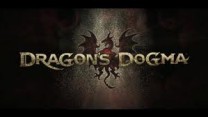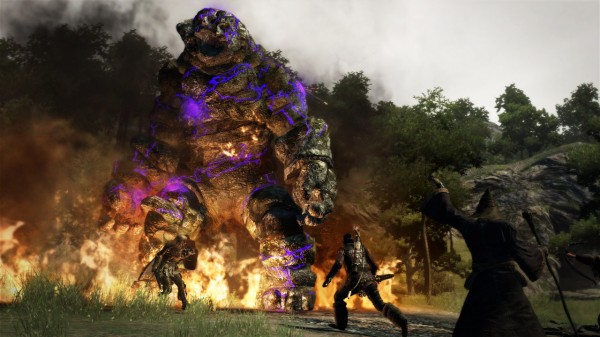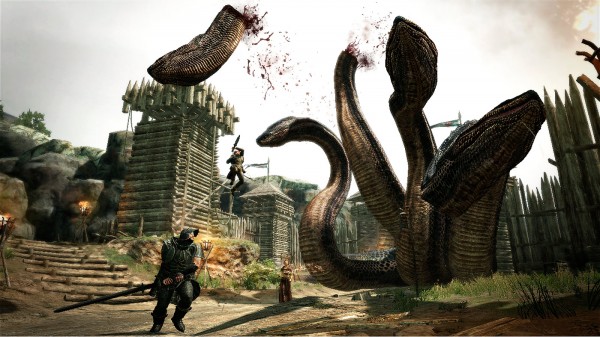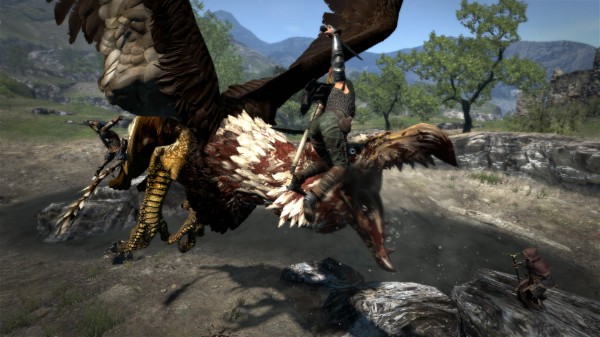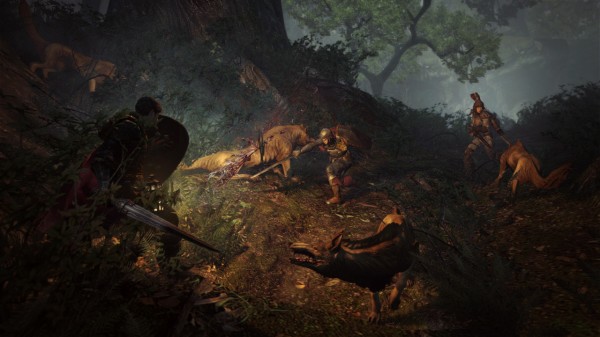I wanna say something. I’m gonna put it out there; if you like it, you can take it, if you don’t, send it right back. I prefer Dragon’s Dogma to Skyrim.
Early on in Dragon’s Dogma, there is a narrative moment where your character, newly arisen from a near-fatal encounter with a Dragon, is released from the infirmary back onto the streets of his hometown. While playing this moment, I walked out of the door of the building and took in the town, looking down on it from the hilltop the infirmary rests on. I saw several little ruined buildings, nothing impressive. A big dam-like wall set back from the beach cove which the town circulates. Graphics: decent; greater than the sum of their parts, the individual parts not being great. Slightly muddy textures, relatively low-res, and all of it in a letterbox to lower the res further.
The game told me to look for quest-givers and notice boards to give me errands or adventures. I ignored these notes. Walking down to the town, I saw a wall connected to one of said ruinous buildings. I decided test the gameplay waters and climb the wall. At the time I was used to and expecting the restriction of player movement common to RPGs; like the foot-locked-to-land effect of Fable or Demon’s Souls or the awkward static-world interactions of The Elder Scrolls. So when I jumped at this wall, and my character ‘Saga’ gripped onto its lip and vaulted up onto it, with crisp energy, I was pleasantly surprised. I climbed further, and reached the peak rooftop of the building. And around the corner, on a little balcony, was a chest with some loot in it.
In any of the aforementioned games; Fable, Demon’s Souls, and TES, not to mention other action-RPG’s like Diablo or Bastion: loot is a main objective, and something that you explore the static, flat world to collect. In Dragon’s Dogma, the simple act of having to climb, as in a platformer, to look in nooks and crannies, brought me right into the world and added a little dash of satisfaction that other RPG’s commonly lack. This felt more like the world exploration of Thief or Bioshock (and had the game been its pitch-black night time, it would have looked like those titles, too.) Even rooting around in an inn, I found a stash of money, and I terrified the innkeeper by approaching him with my big rusty sword unsheathed (…)
It’s the organic tangibility of DD’s world that is the draw here. In exploration it feels like you need to get stuck in and actually push the world to make it push back. The game’s ripe environment is a breath of fresh air compared to the static worlds featured in most RPG’s, that might as well be cardboard cut-outs featuring nice textures and words on. This sense of tactility that DD instills carries over into combat; as a Fighter with sword and shield, I found myself leaping onto Chimera’s faces, grabbing hold, and slashing at their eyes; or sprinting to dodge thrown explosives which shake the whole screen and send battle-members flying on their burst; or calling for help from my fellowship to heal my wounds mid-fight. Which they actually do, and effectively, provided they haven’t been knocked down. And behind all of this, outside of combat, you still need to make money and quest and upgrade your team: with a real, deep, good-RPG-quality role-playing system.
Anyway. Some context. (The boring stuff.)
The game is developed by a Capcom team who have core members that worked on the mostly-seminal series Resident Evil and Devil May Cry. It’s, in game-world terms, the largest Capcom game ever made. It came out May 25th this year on Xbox 360 and PS3, with no mention of a PC version. I’d argue it’s the best game Capcom have made in years; as well as one of the most successful examples of East-meets-West game development and design in the history of the medium.
In your sprawling and freeform adventure, your backup is the variable that varies the most. The supporting system of your supporting party is a mix between Mass Effect’s shipmates and Pokemon. At the beginning of the adventure, you craft your main fellow, or Pawn, just like you craft yourself; you make their appearance, their qualities from voice to bust size, their class and skill focus. In gameplay, you level up your pawn and buy/ collect equipment for them, and ultimately, share them online for the rest of the world to hire as a sellsword. While connected to Xbox Live, I had the option of hiring other people’s main Pawns to make my own fellowship. To do this you either encounter them walking in the world and talk to them or you touch a Riftstone which takes you to a ghostly dark realm which acts as a Pawn-shop. Excuse the pawn. Em. Pun.
You can hire two other pawns alongside your main pawn: a fellowship of four at maximum, and just one, yourself, at minimum (which is suicide generally). Pawns in the ambient gameworld get into scuffles like yourself and generally just fill out the space better than faceless NPCs, who also strut about. But with jars of stuff on their heads. Or other odd behaviours. Anyway, at its best, when you see a total badass walking down the path; a character lovingly and painstakingly designed, equipped, and developed, who appears to be far better than your own hired pawns; you don’t hesitate in nabbing them.
In combat, these Pawns are your first line of defence, but I’ll get to that in a moment. When you strut into a fight, you have skills equipped and qualities of strength and stamina and magic to help you. Your vocation (or ‘class’ as it’s usually called) determines what your primary weapons are; sword right-hand, shield left-hand for Warrior; daggers right-hand, bow left-hand for Strider (Aragorn spinning in his grave); and staff both-hand for Mages. More complex arrangements are unlocked with further vocations (when you reach a high enough level you gain the ability to change vocation, or class, for a price, and these provide many different combinations of skill and focus).
Per weapon-hand you get skills, which vary greatly in type and effect. These skills are deployed by holding the controller-bumper-button which corresponds to the weapon and hitting a face-button you assign yourself. So, if in a fight, as my Warrior character, I want to slam my sword into my shield to get the enemy’s attention (Shield Bash skill), I hold the left bumper for my shield skills and press whichever face-button I’ve set the skill to (X, B or Y). Or, if I want to do an attack which sends my character sprinting forward to do a savage, throwing stab at one enemy, I hold right bumper for sword-set skills and press the button I have set for it.
These special attack skills are highly effective if you’re good enough to deploy them right, and are backed up by your standard-fare light and heavy melee attacks, which can be upgraded, and the ability to ‘grab’ onto things. If you grab a goblin, you’ll hold him full-nelson style so your teammates can have a go (like a fantasy-universe Indiana Jones). However, if you ‘grab’ a giant enemy, like a four-storey cyclops or an eponymous dragon, you hold on to them Shadow-of-the-Colossus style and can clamber all over them while your stamina decreases. The first time you do this is one of those defining moments. For example, I recently fought a Dragon for the first time. I grabbed onto a its weak chest-point, and started hacking away: in its panic, it took off, flying hundreds of meters above the forest we battled it in. I got a nice view of Gransys. My Pawns started shitting bricks and shouting at me. The dragon swiped me off its chest. I fell through the trees, nearly dead. Hit a rock. Blood went everywhere. Dead.
In comparison with my recent experience of wyrm-combat in Skyrim, backpeddling and arrowing for ten minutes straight, this was quite something.
And leads onto difficulty. Dragon’s Dogma’s sense of difficulty is brilliant. It’s not Fable’s effortless swathing. It’s not Demon’s Souls’ zero-tolerance damage-dealing. It’s a perfect balance. Even if you’re hugely outmatched and can’t win, which does happen, flight is always an option due to the game’s open world nature. In fact, the game actively encourages running away in tight spots. Your Pawns, if seeing a failing situation, will actually tell you to run. However, this enunciates one of the game’s very few missteps: while Pawns are always very useful, and if they get downed you can save them (if you don’t they return to the Rift so you can hire them another time), they can’t save you. I think this is a big issue. Death is sometimes really frustrating: and if they could just walk over and save you, which would be easy to implement, the gameplay would last that much longer and remove that frustration.
Aside from this occasional unfairness, legendary evidence of the game’s well-balanced difficulty is at night time. After daybreak, if you encounter a bunch of goblins, you essentially walk in amongst them, your Pawns usually dealing the first blows, and take the group apart like an orange. At night time? You can only see two or three of those goblins: the ones carrying torches. The rest are in pitch darkness (if you have your brightness settings right). And they’re tougher, monsters in the world gaining confidence and gusto and numbers at night time. To be honest, you’ve probably waded into the horde already and not realised it. Not until they start blowing their warhorns and bearing down on you from all sides, pushing your party into a tight circle of defence. (What gets even worse is when you fight giant or flying enemies in the dark. Hooboy.)
Dragons Dogma’s night time is probably one of the most compelling game mechanics I’ve ever experienced. It becomes tense, sometimes nightmarish (yet still fun) survival horror, rather than the action RPG of the daylight hours. Night time is about surviving. Oh, and I forgot to mention: daytime is also for straight-up questing and… Picking flowers.
I collected flora in Red Dead Redemption when I had to. I got ingredients in Skyrim when a quest demanded it. But not once did I engage in any of these resource-collecting activities of my own accord. Dragon’s Dogma, in one fell swoop, got me grabbing ‘greenwarish’ and ‘sunbright’, combining them and looking for variations, all the fucking time! Because, like in Demon’s Souls, you badly need restorative items, and in Dragon’s Dogma, they’re all around you! On the ground, in enemies pockets, in shops. Once you start grabbing and mixing, it’s impossible to stop. It’s super compelling because in the game it’s as justified a resource as health or magic; not simply some arbitrary objective the game sets you on like the aforementioned titles. So when you knock together ‘Balmy Incense’ by combining ‘Harspud Milk’ and ‘Greenwarish’; a drink which heals your entire party, at once, significantly, the sense of satisfaction is great.
Finding flora and fauna is one thing, but this gardening activity is only as strong as the world you do it in. So, in order to make actual physical exploration fun in the game, Capcom have veiled the open world map from the start. Unlike almost any free roaming game I’ve played, you have no idea where the land goes or how large it actually is. It’s all fogged. The sense of emergence this brings is stunning: after about 20 hours of gameplay I had uncovered only a sliver of Gransys’ East Coast which is where the game begins. I had so far to go, and no idea of the shape of things to come. Walking in to a mountainous region then brings a sense of trepidation and true adventure. You can’t just pop open the map like in Skyrim and look at what’s coming. That innocent-looking pass ahead could harbour a griffin, or worse, a cyclops with a few bandits, or worse, a goddamn dragon!
Besides all these gameplay wonders, don’t expect an amazing story. Dragon’s Dogma joins that canon of game, like Far Cry 2 or Dwarf Fortress, where your own adventure and the gameplay itself makes the story. It’s an emergent experience, not scripted and in stasis like the endless RPGs of yore. The gameplay design is where the meat is: climbing a hydra (goddamn huge, some of the enemies are massive) and trying to hack it’s head off to save a swallowed team mate feels so organic. Expect tens of quests just going to a place and beating enemies; or escorting some noob AI across the country; or just looking somewhere for something. These are macguffins to make money. The real fun of the experience is you making your own Lord of the Rings adventure: it’s about the travel, not the destination, and the solid, meaty gameplay systems make the travel more worthwhile than many a fantasy RPG or action game released to date. In a way, this undermines a lot of the set-up: rather than come becoming the fabled dragon-slayer you’re set up to be, you’re basically just a sellsword. Paid to do slashey stuff for money. Start to finish. However, lose the preconcepion that you’re on some sort of important pilgrimage, and being a sellsword in Dragon’s Dogma is just fine. Damn fine.
Some of the design choices made by Capcom are seen as flaws by many players; the lack of a compelling story, the lack of a multiplayer mode, specifically co-op (which would be very nice, but really isn’t necessary), and some arguably convoluted gameplay systems. Regarding the quality of the simulation, the worst I’ve noticed is some slight animation clunkiness (common to Capcom games), the odd bug, and very rare AI issues. Aside from that, the general lack of polish is easy to ignore behind the game’s fantastic gameplay and adventure. In that regard, saving is a bit awkward, you only get one save file (though your character effectively is reset every time you change to a new vocation and there is apparently a new game plus option) and Pawn voices get incredibly monotonous and repetitive. These are but superficial blemishes on a beautiful, pretty face of a game (before it’s cut up and scarred in gruesome battle, but still somehow maintains that beauty.) I should probably note, too, in bold, that you have to cut the HUD right down in the menus for gameplay as, at default, it’s one of the most clunky and awful interfaces made for an action game. For an RPG, fair enough, but with a focus on action, no thanks.
Anyway. That’s a rundown of why Dragon’s Dogma is, on the whole, so great. More people should get it, and tell their friends. You should get it, and tell your friends. Ignore all those ‘decent’ or ‘good’ reviews. I think this game should be getting ‘great’ reviews. It’s ballsy, and at a high level those balls pay off. It’s pushing the genre in clever, obvious new ways; ways that will become standard in the future. I will hold out achingly in my heart for sequels. Always.
